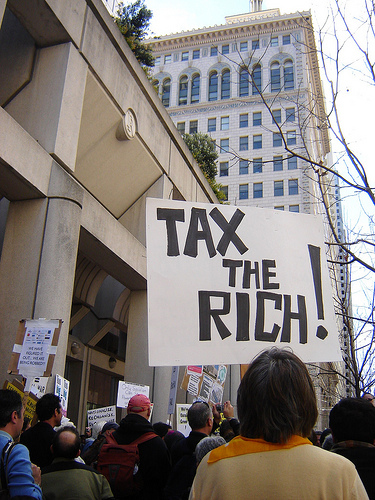
(1) More from Polly Cleveland on Property Taxes: A couple of posts ago I complained about the New York Times' coverage of deficits and taxes. The one that really steamed me reported on a NYT/CBS News poll in which a majority of people allegedly preferred cutting spending to raising taxes as a way of dealing with the federal deficit. But it turns out the poll asked people these questions: "Do you think it will be necessary or not necessary to cut back on government programs that benefit people like you?" and "In order to reduce the federal budget deficit, do you think it will be necessary or not necessary to increase taxes on people like you?" The first question sidesteps the divisive question of paying for other people's social services (though framing it that way allowed the Times to conclude that people are wary of cuts to "entitlements," which is surely true); but the second question left no room for people to express the view that the rich should be taxed more heavily. Ugh.
Anyhow, here's more from Polly's blog about one way we could tax wealth; she addresses one of the other Times articles that irked me last week:
To End Deficits, Allow Localities to Raise Property Taxes
By Polly Cleveland, on January 23rd, 2011
In Higher Taxes Wouldn’t End Some Deficits (Jan 20) the New York Times reported how a few state governors have timidly proposed small income tax increases. There’s a better alternative: undo the legal shackles that keep residents of towns or school districts from voting themselves higher property taxes.
Read the original post.
(2) More on Bill Black: Bill Black, former banking regulator and author of one of the feature articles in our current issue, Still Banking on Fraud, just spoke at the North American Securities Administrators Association (NASAA) annual enforcement conference in Charleston, S.C. He wrote to us:
today's WSJ article
Note also that one of the people Bill mentions in his article, Franklin Raines, has been in the news recently. Here's what Bill said about Raines, the former CEO of Fannie Mae:
BusinessWeek
- Investment banking is a business that’s so denominated in dollars that the temptations are great, so you have to have very strong rules. My experience is where there is a one-to-one relation between if I do X, money will hit my pocket, you tend to see people doing X a lot. You’ve got to be very careful about that. Don’t just say: “If you hit this revenue number, your bonus is going to be this.” It sets up an incentive that’s overwhelming. You wave enough money in front of people, and good people will do bad things.
Raines knew what he was talking about: he installed a compensation system at Fannie Mae that produced precisely these perverse incentives among his staff and made him wealthy by taking actions that harmed Fannie Mae.
Why is he in the news? Because Gretchen Morgenson broke the story that Raines and other execs from Fannie and Freddie are having their legal defense bills picked up by taxpayers, to the tune of $160 million.
So not only are we not taxing the rich very much, we're paying their legal bills when they defraud us!
--Chris Sturr
